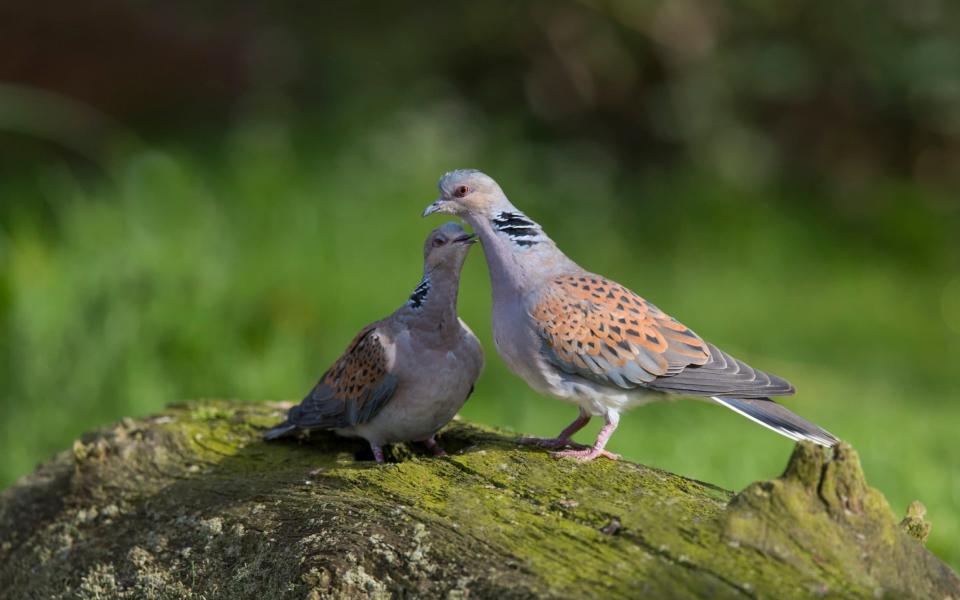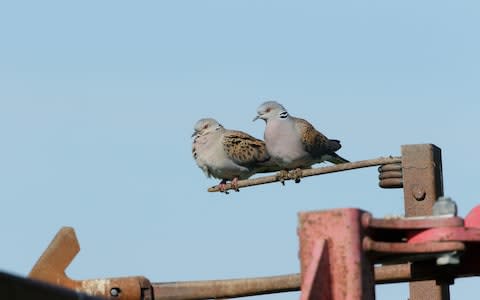Farmers who help turtle doves should be rewarded with government cash, RSPB says

Farmers who set up reserves to help at risk turtle doves should be given government subsidies, the RSPB has said.
The birds, which were once abundant in the UK, are now hurtling towards extinction as their numbers have halved in five years. There are barely 1,000 breeding pairs left in the UK, a 98 per cent decline since 1970, making it Britain's most endangered bird.
The decline of the turtle dove is largely due to agricultural changes including the loss of mixed farming, high production focused arable and livestock management, increased effectiveness of herbicides and weed removal from crops.
These have all led to huge reductions in annual plants (usually called ‘weeds’) on our farmland – the seeds of which were turtle doves main food during the summer.
One farm, backed by the RSPB, has set up a reserve specifically for the embattled bird, and it is thought to be the biggest dedicated farmland space for turtle doves in the country.
The arable farm in Cambridgeshire is run by the G's Fresh growers association, and farmers have planted turtle dove friendly seeds and given them space to roost.
Over the last two years, the farmers have dedicated over 10 hectares of land – roughly 10 football pitches – to helping turtle doves by providing the food, water and nesting habitat they need.
While they had not had any turtle dove pairs land in years, since they planted seeds and strew bird feed in the land dedicated for the birds, some have made the habitat their home.

Stewart McIntyre, estate sporting and conservation manager at G’s said: “Over the last two years we have dedicated over 10ha of land solely for the turtle dove, this includes fields drilled with a specifically designed mix ...the fields are carefully managed to allow access to feed."
The birds are carefully looked after with workers on the farm making sure they have clean drinking water.
Mr McIntyre added; "Within close proximity to feeding sites under the guidance of the RSPB and Natural England we have created access to drinking water, enabling the birds to digest their high seed content diet. Nesting habitat is vital so we ensure we adhere to correct hedgerow management and allow scrubby areas to grow within close proximity of food and water. We are providing the three key elements turtle doves require.
“In addition we put out supplementary feed which benefits a whole host of species as well as the turtle doves. Turtle doves hadn’t appeared in our bird surveys for the last four years, until 2018 when two separate pairs of turtle doves were heard purring, which is a great indicator our habitat creation is working. It is vital that we as custodians of the land allow a suite of farmland wildlife to cohabit alongside our operations, achievable through conservation efforts and focusing on target species such as the turtle dove.”
Guy Anderson, the RSPB’s migrant birds expert said this needs to be replicated across the country if the bird is to survive and called for the government to act.
He added: “In the UK we know that there is a real danger that without urgent action the turtle dove may be lost as a breeding species, and we could lose its distinctive summer purr from the countryside forever. Every year they fly here all the way from Africa to raise a family, and the best way we can help them is to ensure that once they arrive there is enough food and shelter available so they can feed themselves and their young.
"The RSPB is supporting different groups in different ways to create the habitats and food the species needs to keep the bird in the UK, and we are already seeing the effects of this in areas where groups are working with us.
“There are also things that the government of the UK can do, and any new legislation and policy for agriculture must support nature-friendly farming. We should ensure that our farmers and land managers are rewarded for the positive role they play in restoring and enhancing our natural environment, and encourage more to look at how they can help species such as the turtle dove.
“And looking globally, nature knows no boundaries, so it is important we are working with all of the countries along the turtle dove flyway to ensure these amazing birds are getting the protection they need.”

 Yahoo News
Yahoo News 